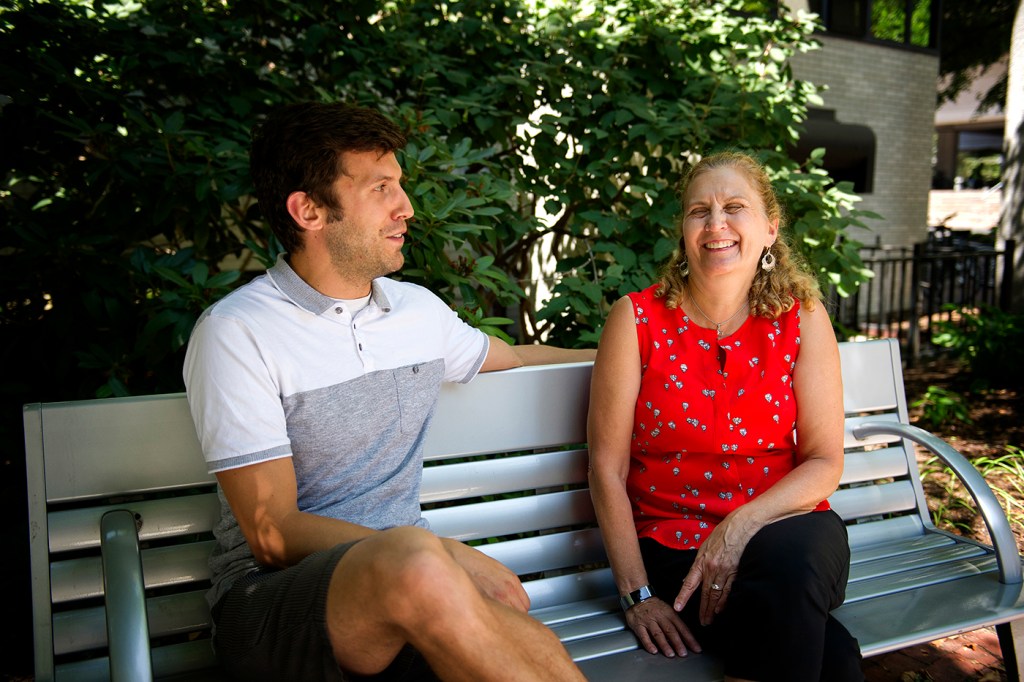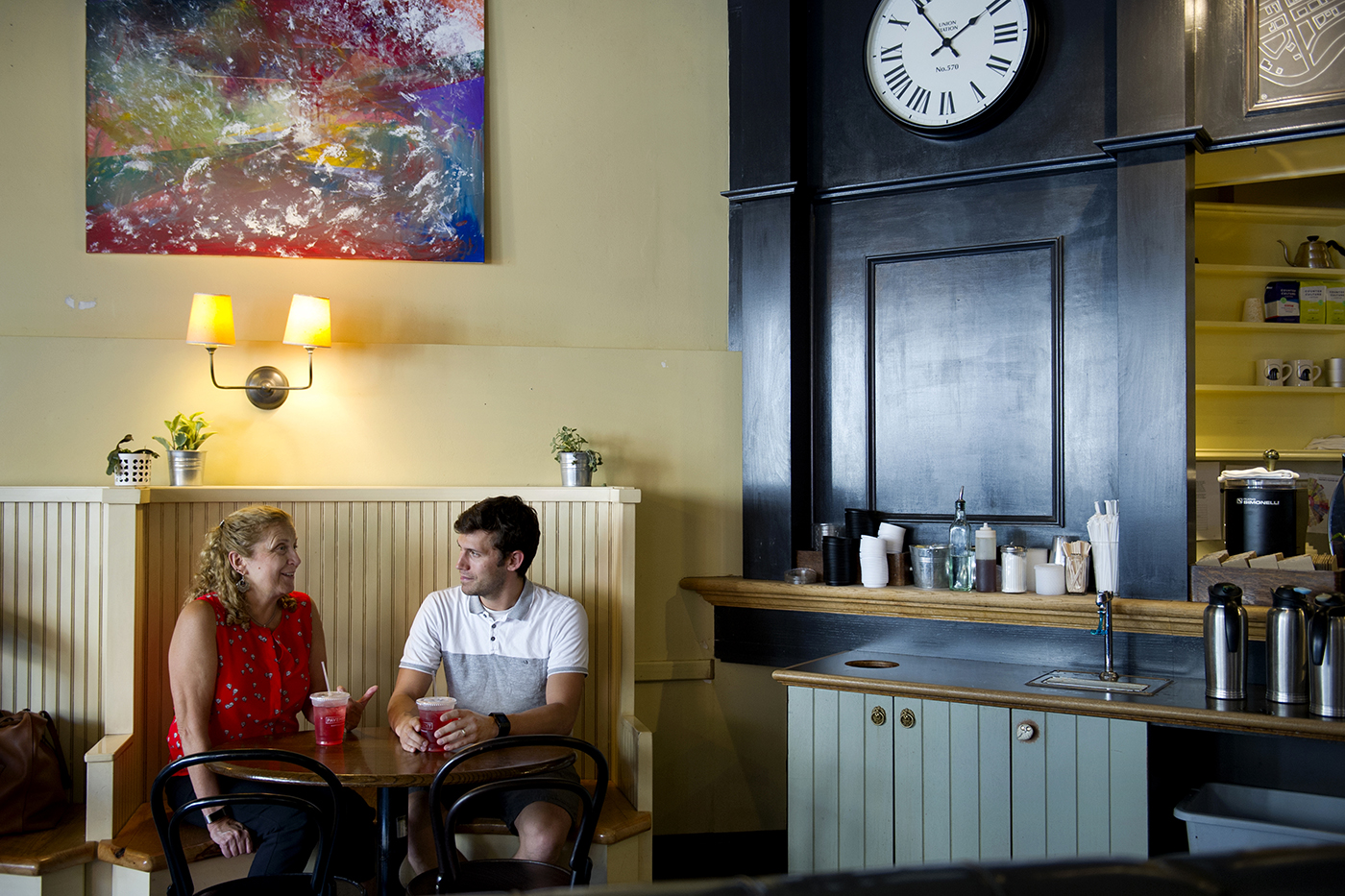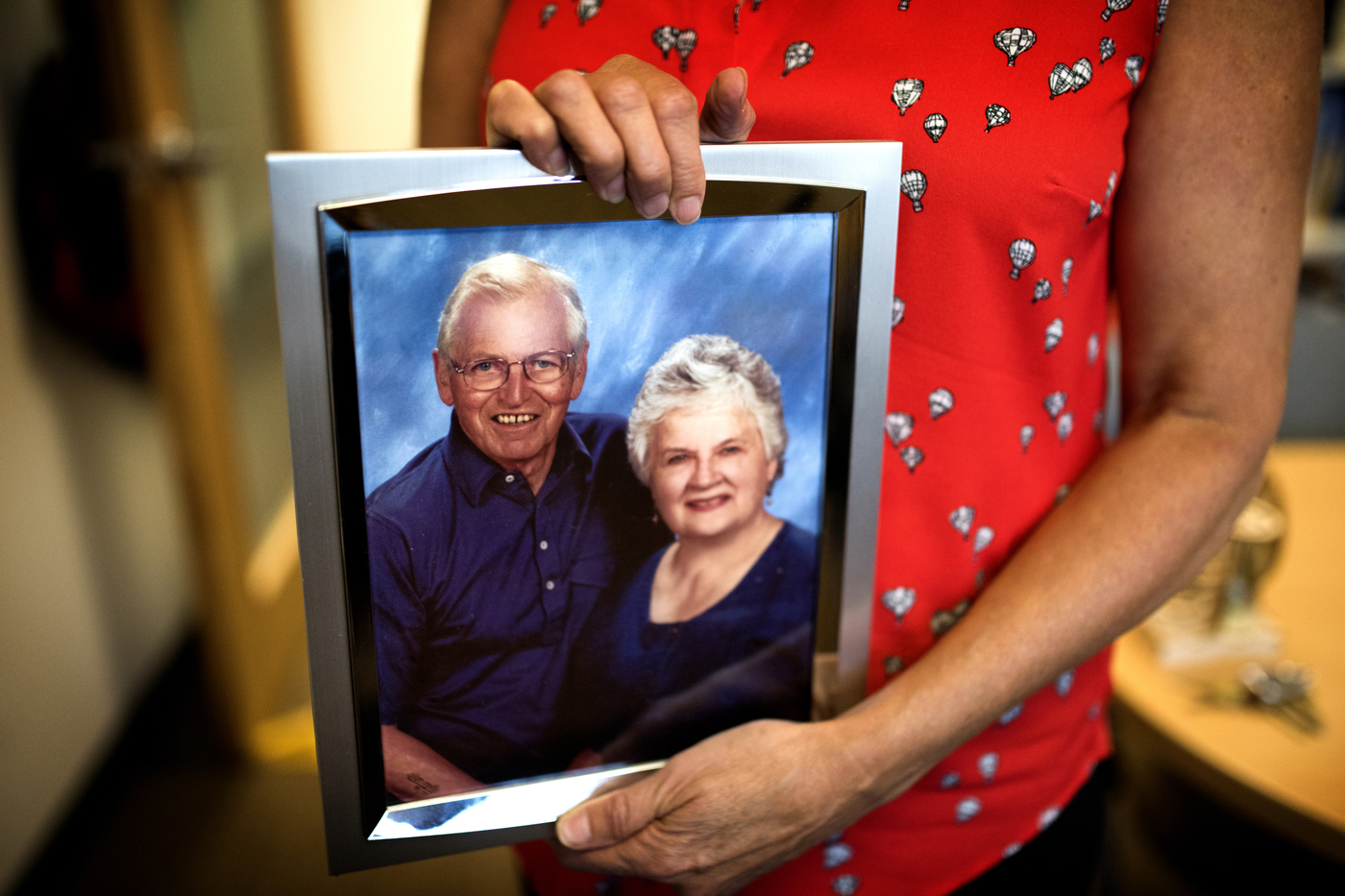For six decades, the Freemans have called Northeastern home

It had become a tradition. Virtually every morning, Sue Freeman and her son Ben Harris would eat a bagel and coffee breakfast at a small café on Gainsborough Street.
It started in 2004. Freeman, E’79, ME’80, PhD’96, was a teaching professor in the College of Engineering. Harris, E’08, MS’09, PhD’17, was a second-year industrial engineering major. And mom had noticed that son had been falling asleep in her “Introduction to Industrial Engineering” course, held bright and early at 8 a.m.
Yes, Harris was a student in his mom’s class. No, it was not particularly awkward. “I had grown up on Northeastern’s campus,” says Harris, now a part-time lecturer in the College of Engineering, “and it was neat to finally see her passion for helping her students develop and succeed.”

Freeman and Harris at Pavement Coffeehouse, formerly Espresso Royal Cafe, where they would meet up for breakfast before class. Photo by Matthew Modoono/Northeastern University
Freeman, for her part, had resolved to help her son fix his problem of dozing off during her class. She donned her mom hat, extoling the virtues of a little early-morning pick-me-up. “I’ve known you for a long time,” she told him, “and you need to eat when you get up.”
The pre-class breakfast routine worked—Harris earned an “A” in the class—and it lasted until 2008, when he received his undergraduate degree. As he recalls, “It was a good chance to spend some quality time with my mom.”
One university, three generations
The Freeman family connection to Northeastern dates back 60 years, long before that small café on Gainsborough Street even existed. It’s a legacy that begins with Freeman’s father, David Freeman, MS’62, who enrolled in the university’s engineering management graduate program in 1957.
After receiving his doctorate from Stanford University, he returned to Northeastern, where he served as chair of the Department of Mechanical and Industrial Engineering and director of the Graduate School of Engineering for parts of the 1970s, 80s, and 90s. During his tenure as an administrator, all five of his children—and two of his grandchildren, including Harris and his sister, Anna Harris, AS’09—received at least one degree from Northeastern. “I used to joke that I’ve been at Northeastern my whole life,” says Freeman, who was born a few years before her dad starting taking graduate-level classes at the university.
In 1978, he led her operations research course. He also taught her would-be husband, whom she met on campus. “My father was brilliant, and taking a class with him was great,” Freeman recalls, noting that she would often re-write his overhead projector notes in more legible handwriting for the benefit of her classmates. “I was proud that my dad was so knowledgeable.” Freeman received an “A” in the course, but her dad refused to grade her papers and exams. At the end of the semester, he waited to reveal her grade until her classmates had received their marks. “I liked learning, but he was tough,” she says, describing her dad as an “old-school” professor who made his students work extra-hard in order to earn “As.” “I think he was probably harder on me than anyone else.”
Freeman’s father died in 2011, at the age of 79. As it happens, she carried his tough but fair teaching philosophy into her own classroom—and it’s worked. In 2017, she was one of two faculty members to receive the College of Engineering’s Fostering Engineering Innovation in Education Award. “It’s surprising what you take from your parents without realizing it,” says Freeman, teaching professor since 1997 and director of the first-year engineering program since 2014. “I tell my students, ‘Your grades are earned. They’re not a gift.’”

David Freeman and his wife Elsa, to whom he was married for 57 years. Photo by Matthew Modoono/Northeastern University
Harris’ teaching philosophy has been informed by watching her mom work in not one but two courses. In his senior year, he took her class in stochastic modeling, a form of financial modeling. “What I’ve taken most from her is the importance of building individual relationships with my students,” Harris says. “I try to find out what my students are passionate about.” As a part-time lecturer for the past five-and-a-half years, he has repeatedly taught two courses that her mom has run: stochastic modeling and engineering economic decision-making, the latter of which his grandfather also taught when he was working at Northeastern. “Ben really loves teaching,” says Freeman, who has occasionally asked her son to guest-lecture her students. “His enthusiasm for the material is clear, and he does a good job of taking complex things and making them understandable.”
‘We all really liked math’
Like his mom, Harris earned all three of his Northeastern degrees in industrial engineering. But he didn’t specifically set out to follow in her footsteps, just as she did not plan to follow her dad’s lead. What they all had in common was a love for math. Freeman took “every math class [she] could” in high school, and, she says, “Ben is an absolute math whiz who used to do math problems for fun as a kid.” As she explains, “I think we all really liked math, and industrial engineering is the most math-based engineering field.”
Both Freeman and Harris found that their co-op experiences had shaped their career paths. Freeman did her first co-op at Massachusetts General Hospital, in Boston, where she worked to optimize elevator performance, bill processing, and hospital-wide drug delivery. “I wanted to be a biomedical engineer,” she recalls, “but I did this co-op before I had picked a major and I loved it.” Harris did his second co-op at Mac-Gray, the industry leader in commercial laundry systems, where he focused on truck route optimization. “It forced me to learn how to apply engineering knowledge and communicate that to people who were not in engineering,” says Harris, who’s been working as a systems engineer at Raytheon for the past nine years. “That experience showed me that I really wanted to focus on operations research.”
All told, Harris and Freeman have spent more than 40 years of their lives at Northeastern. And they wouldn’t have it any other way. What’s kept them here, they say, is the university’s strong sense of community among students, faculty, and staff. “It’s an outstanding school,” says Freeman, “with great colleagues and wonderful students.” As Harris puts it, “I have developed some strong friendships with my colleagues, who are genuinely interested in what’s going on in my life.”





